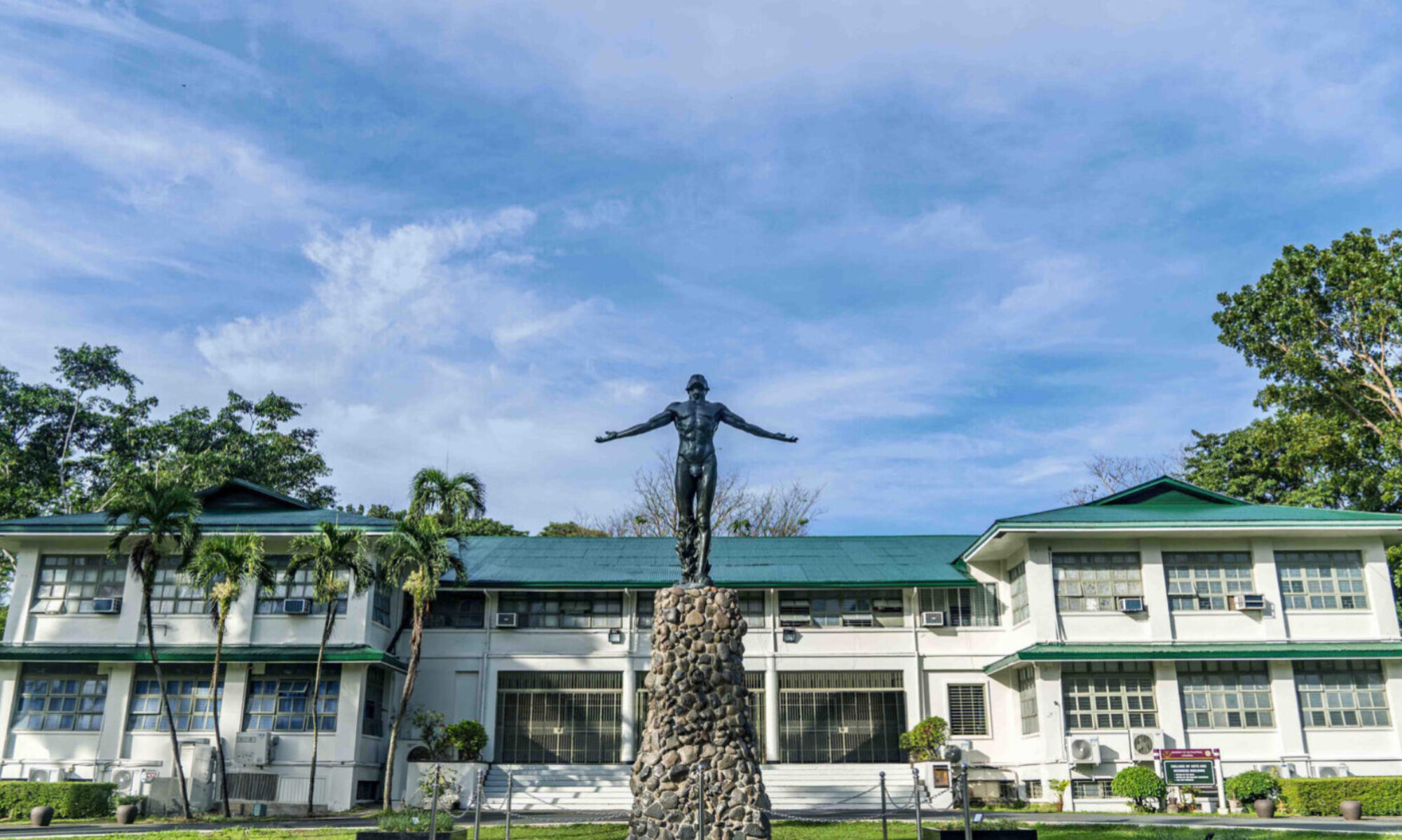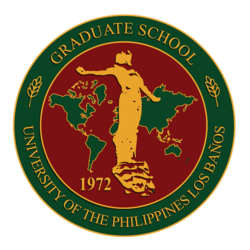THE UPLB GRADUATE SCHOOL
ABOUT GS
Graduate studies at UPLB aim to develop the ability of students in critical inquiry and independent research towards the advancement of knowledge and the development of professional leadership.
The Graduate School integrates graduate programs in agriculture, forestry, the basic sciences, mathematics and statistics, development economics and management, agrarian studies, and human ecology. It also caters to the increasing demand of graduate offering in other disciplines like agricultural engineering, land and water resources engineering, molecular biology and information technology, food science and technology, food and nutrition planning, and veterinary medicine.
The Graduate School administers all graduate programs offered by all Colleges/School of UPLB.
Mission-Vision
#UPLBGS202x: DESIGN FORESIGHT AND CO-CREATED ACTION FOR THE NEXT-LEVEL GRADUATE EDUCATION
What is #UPLBGS202x? The cybermeaning of ‘x’ is ‘embracing variability’ starting from year 2021 to 2029, or even beyond this decade. GS202x prepares the UPLB Graduate School (GS) to face the volatile, uncertain, complex, and ambiguous (VUCA) world of the future.
VISION: UPLB Graduate School leading the next level VUCA-proof, impactful glocal Graduate Education beyond GS202x.
MISSION: To co-create #UPLBGS202x systems and experiences, directed by data-driven and glocal anticipatory design, and supported by lean, agile, and humanized processes.
“Shaping Graduate Education of the Future”
History
Graduate programs at the University of the Philippines Los Baños (UPLB) started as early as 1913 under the College of Agriculture. One graduate student of the College was awarded the degree of Master of Science in Agricultural Chemistry during that year. Graduate studies in the University of the Philippines was then supervised by the University Graduate Committee which administered the graduate programs of all the units of the University.
Realizing the need for more adequate instruction on the graduate level, the Board of Regents established the University Graduate School headed by the Dean on October 26, 1950. Under this set-up, the U.P. Graduate School administered the graduate program at Los Baños through a Sub-Committee for the Los Baños unit. The Dean of the College of Agriculture was the ex-officio chairman of this sub-committee. Within the next few years, the curricular offerings at Los Baños continued to expand and enrollment increased. To cope with the expansion, the Office of the Director of Graduate Studies under the College of Agriculture was created in January 1970.
The field of higher education took a higher step on November 20, 1972 when Presidential Decree No. 58 was issued. This decree authorized the U.P. Board of Regents to establish a University of the Philippines System, including an autonomous University of the Philippines at Los Baños. Consequently, a full fledged and distinct UPLB Graduate School was established on December 21, 1972.
Dr. Fernando A. Bernardo was the Director of Graduate Studies prior to the creation of the UPLB Graduate School. Dr. Faustino T. Orillo was the first Dean of the UPLB Graduate School.
Graduate Studies at UPLB aim to develop the ability of students for critical inquiry and independent research towards the advancement of knowledge as well as to develop professional leadership. Besides paving the way to specialization in selected fields, graduate work is designed to encourage independent work and to promote research. Graduate students, therefore, are admitted to candidacy for a degree only after demonstrating distinct ability in graduate work.
The UPLB Graduate School integrates and administers graduate programs in agriculture, forestry, the basic sciences (e.g. biology and chemistry), mathematics and statistics, development economics and management, agrarian studies and human ecology. It also caters to the increasing demands for graduate offering in other disciplines like agricultural engineering, land and water resources engineering and agrometeorology. Graduate programs in food science and technology, food and nutrition planning and veterinary medicine are likewise offered. The graduate programs cover a wider array of specialization. The main thrusts of the Graduate School offering are in Food Security and Sovereignty, One Health, Resilience and Sustainability, and Future Communities and Institutions.
The UPLB graduate programs lead to any of the following degrees:
- Graduate Diploma
- Professional or Non-thesis Master’s
- Master of Arts (MA)
- Master of Science (MS)
- Regular Doctor of Philosophy (PhD)
- Straight PhD
- PhD by Research
- Dual PhD by Research
The UPLB Graduate School is continuously innovating by instituting new degree programs with significant impact to the society. Certificate and Diploma programs, Stackable courses, and Postdoctoral fellowships are being designed to cater to a wider set of learners and researchers. Quality Assurance is at the heart of the UPLB Graduate School.
“In Pursuit of Innovation, Interdisciplinary Collaboration, Internationalization, and Inclusive Development”
DEANS OF THE UPLB GRADUATE SCHOOL
| NAME | PERIOD |
| Dr. Faustino T. Orillo | 1973 – 1979 |
| Dr. Dolores A. Ramirez | 1979 – 1989 |
| Dr. Noel G. Mamicpic | 1989 – 1992 |
| Dr. Gil G. Divinagracia | 1992 – 1995 |
| Dr. Ann Inez N. Gironella | 1995 – 1998 |
| Dr. Rita P. Laude | 1998 – 2003 |
| Dr. Evamarie P. Capareda | 2003 – 2005 |
| Dr. Ernesto V. Carpio | 2005 – 2007 |
| Dr. Oscar B. Zamora | 2007 – 2011 |
| Dr. Jose V. Camacho, Jr. | 2012 – 2020 |
| Dr. Jomar F. Rabajante | 2021 – present |
On December 21, 2022, UPLB GS marks its 50th anniversary.

Organization
Graduate studies are supervised by more than 500 graduate faculty members from the nine different colleges and one school of UPLB. It is headed by the dean who, with the assistance of the college secretary, implements the policies, rules, and regulations of the graduate faculty. The GS dean is advised by the Graduate Academic Advisory Council composed of the deans of the different colleges and the chairs of the standing committees of the Graduate School. Graduate students constitute about 10% of the student population of UPLB; and 10% of this population are international students.
Notable Achievements
The UPLB Graduate School was established on December 21, 1972 to administer all graduate programs of the campus. At present, it offers more than 90 graduate degree programs, including the Straight PhD and PhD by Research programs. Only the UPLB Graduate School offers the MS Wildlife Science, PhD Applied Mathematics and PhD Veterinary Medicine programs in the country. Moreover, there are some areas of specialization in botany (plant systematics) and entomology (systematics, acarology and aphidology) which are unique to UPLB.
UPLB has strong graduate programs in Environmental Science, Community Development, Development Communications, Forestry, Agricultural Economics, and Agricultural Engineering, among others that consistently have a high rate of enrollment.
About 40% of those conferred graduate degrees at UPLB came from foreign countries. Many of them were from Asia, such as Thailand, Indonesia, Nepal, Bangladesh, Vietnam and China and many specialized along the areas of Agronomy, Agricultural Economics, Forestry, Nutrition Planning, Community Development, Animal Science and Soil Science. Many of these graduates are now holding key positions in their respective countries and are now in the forefront of development initiatives, policy formulation and implementation.
The UPLB Graduate School is a founding member of the Southeast Asian University Consortium for Graduate Education in Agriculture and Natural Resources, launched on September 1989 through the initiative of SEARCA to foster collaborative efforts to enhance graduate education in agriculture, environment and natural resources in the region. As such, it shares resources and expertise, and engages in student/faculty exchange, and research fellowships with other members of the consortium, namely Institut Pertanian Bogor (Indonesia), Universitas Gadjah Mada (Indonesia), Universiti Pertanian Malaysia (Malaysia), Kasetsart University (Thailand), University of Queensland (Australia), University of British Columbia (Canada), Tokyo University of Agriculture (Japan), Universitas Brawijaya (Indonesia), Central Luzon State University (Philippines), Visayas State University (Philippines), and Maejo University (Thailand).
Graduate programs are being offered at the UP Professional School for Agriculture and the Environment (UP PSAE) in Panabo City, Davao del Norte. This School was established in partnership with ANFLOCOR.
GS Office/Building (Then & Now)




UP PSAE (proposed building)





